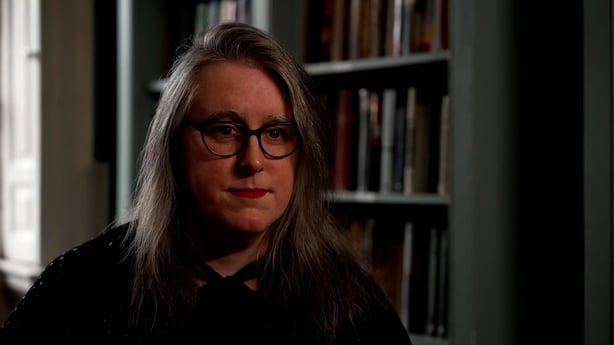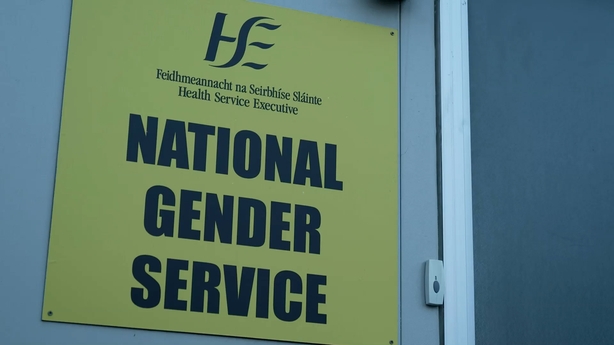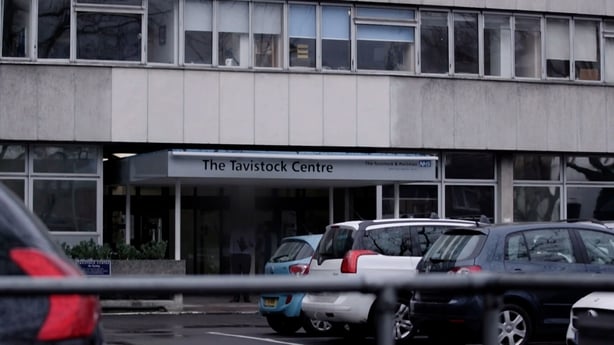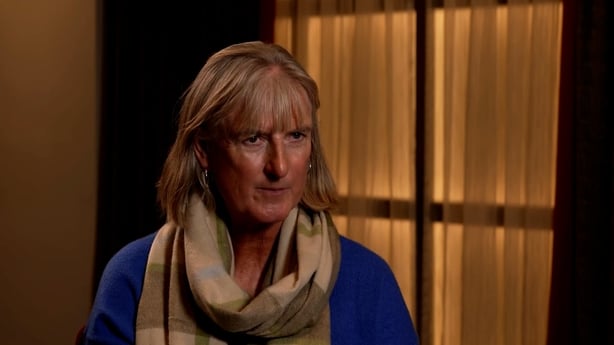The two most experienced clinicians involved in transgender healthcare in Ireland have made a formal complaint to the Health Information and Quality Authority (HIQA) about the Health Service Executive's (HSE) treatment of children with gender identity issues, Prime Time has learned.
Professor Donal O’Shea and psychiatrist Dr Paul Moran of the National Gender Service (NGS) allege that the HSE has been directing children to services overseas that adhere to a so-called 'gender-affirming’ Model of Care.
Prof O’Shea and Dr Moran say that the gender-affirming model can damage children and is associated with a greater readiness to start on inappropriate medical treatment for patients presenting with gender identity issues.
Dr Moran told Prime Time that the complaint to HIQA cited "a series of cases as examples of harm and risk caused to Irish children by these services".
The HSE flatly denies any allegations that it has put children at risk.
Watch the full report on a special edition of Prime Time:
Ireland, along with other countries, has seen a surge in cases of gender-questioning adults and especially children in recent years.
A Children’s Ombudsman survey last year of children aged 12-17 suggests that one in 25 identifies either as non-binary or as being a gender different to their biological sex.
How these children should be treated is at the core of the dispute which is often heated.
The gender-affirming Model of Care, favoured by transgender activists and some clinicians internationally means accepting a patient’s own view of their gender identity.
This approach is supported by World Professional Association for Transgender Health (WPATH), an organisation made up of both activists and clinicians specialising in trans healthcare. The WPATH model is supported by the Irish Government.
Dr Moran and Prof O’Shea argue that an exploratory Model of Care based on "probing assessment" should be used. They argue that this approach has a stronger role for psychiatry and is more comprehensive and safer.
Niamh Ní Féineadh from Trans Healthcare Action says that instead of causing harm, the gender-affirming model relieves distress for those needing healthcare.
Transgender youth and adolescents who receive gender-affirming care "report better body image, they report better self-confidence, and they report better overall mental health after receiving care than before," she said.

According to the World Health Organization, gender-affirming care encompasses a range of social, psychological, behavioural, and medical interventions "designed to support and affirm an individual’s gender identity".
For children undergoing puberty, those interventions can include therapy and also medication, in the form of puberty blockers, though restrictions on their prescription have recently been introduced.
For children over the age of 16, cross-sex hormones may be prescribed. People over the age of 18 may opt for gender-related surgery, although those surgeries are not generally available in Ireland.
Others may socially transition and not embark on any medical treatment.
There is currently no functioning public service for children in Ireland with gender-identity problems and the adult service has a waiting list in excess of three years.
"There’s no public service in England. There's no public service in Ireland," says Ms Ní Féineadh said.
For some teenagers, she said, there is "the potential to be re-referred on to the adult service here, but the waiting list for that is so long that you'll be an adult by the time you get seen."
Ms Ní Féineadh supports a gender-affirming model of care over an exploratory model.
"The patient-centred gender-affirming model means that doctors, patients and their parents should work together as a team. They should have a trust relationship. They should understand the patient's needs at any one given moment," she said.
The doctors should then present the treatment options and information to the patient, she said.
"The patient should be supported in whatever decision that they make. It's kind of like supporting a child who wants to learn a language or an instrument," she said.
Under this model, according to Ms Ní Féineadh, the patient would decide on treatment even when the clinician is recommending against it.
"It's absolutely the, the patient's decision… The doctor can make a recommendation, but it should be up to the patient to decide on their treatment path."
Ms Ní Féineadh says the exploratory Model of Care supported by Dr Moran and Prof O’Shea can be invasive and stigmatising.
"I attend a regular transgender support group, and I hear people describe the interviews that they have had, the four-hour assessment that they've had. I've heard them describe that in tears," said Ms Ní Féineadh.
For adults to be referred for gender confirmation surgery in Ireland through the NGS, up to three further interviews can take place, she said.
"Those are very in-depth, and they talk in very specific and graphic detail about your sex life, what sex acts you enjoy, and how the surgery is going to impact those…That depth of conversation is unnecessary."
"What other medical procedure do you have multiple in-depth interviews before you proceed with it? Do you have an in-depth interview with a clinical psychologist before you get an appendectomy?" she asked, describing as a "pathologising of transgender healthcare."

Tavistock Centre
Prime Time understands that the complaint made by Dr Moran and Prof O’Shea highlights concern over a clinic in Belgium and England’s Gender Identity Development Service (GIDS) based at the Tavistock and Portman NHS Foundation Trust in London, where clinicians generally follow a gender-affirming Model of Care.
The HSE referred 229 children who identified as having a gender that did not match their biological sex to the Tavistock from 2015 to 2022.
The Tavistock was shut down for new referrals last year, leaving children in need of specialist gender assessments in the lurch. Children already being treated by the Tavistock continue to receive treatment there.
The closure of the Tavistock to new patients came after reviews by the Care Quality Commission (CQC) and paediatrician Dr Hilary Cass revealed unsatisfactory levels of care and a service overstretched by a 26-fold increase in referrals from 136 in the year to March 2011 to 3,585 in the year to March 2022.
The Cass review found that some Tavistock staff felt "under pressure to adopt an unquestioning affirmative approach and that this is at odds with the standard process of clinical assessment and diagnosis that they have been trained to undertake in all other clinical encounters."
It also noted that another review team was "particularly concerned about safeguarding shortfalls within the assessment process. There is also limited evidence of systematic, formal mental health or neurodevelopmental assessments being routinely documented, or of a discipline of formal diagnostic formulation in relation to co-occurring mental health difficulties."
In a statement to Prime Time the Tavistock said that: "We acknowledge the issues described by the Care Quality Commission" and that "NHS England has decided to implement a new model of care."
It also said it works "thoughtfully and holistically" with young people and that "only a minority... go on to access any form of physical intervention," at their service.

Dr Moran and Prof O’Shea, better known as National Lead for Obesity, set up the National Gender Service in 2018.
They agree that when properly assessed, prepared and appropriate, "very good outcomes" can come from medical treatments for gender dysphoria.
"However, if other problems that the child experiences or the adult are not addressed, it can exacerbate those problems, such as, for example, social avoidance, functional impairment," Dr Moran said.
According to Prof O’Shea, from around 2016, the National Gender Service in Ireland began to see cases of patients referred to them as adults who had been poorly assessed at the Tavistock clinic and who had started on courses of treatment that were not appropriate.
"They were coming to us as young adults. They were clearly not ready for the hormonal phase of their transition to start, but that had been started," Prof O’Shea said.
"Individuals that we did not think were ready were well under way with their transition and having great mental health difficulties as a result of that."
Dr Moran and Prof O’Shea also allege that the HSE is in thrall to the gender-affirming Model of Care promoted by transgender activists that is based around the concept of informed consent.
"It is driven by the patient," Prof O’Shea said. "They use the term ‘informed consent,’ which is the patient has informed themselves and consents to the treatment."
"That's not the informed consent model that works in medicine, that we're obliged by the Medical Council to adhere to, where we inform the patient in detail of the risks and benefits, and then make a joint decision."
Dr Moran and Prof O’Shea had long raised concerns about the Tavistock with the HSE.
In March 2019, Dr Moran wrote to the HSE - ccing NGS colleagues including Prof O’Shea - requesting that it stop referring patients to the Tavistock.
"Terminating the Tavistock service as quickly as possible," was a priority the email stated.
Both doctors say that their concerns were ignored.
The HSE told Prime Time that following receipt of Dr Moran’s emails, "we assured ourselves of the governance over the clinical pathway of referral to Tavistock and also confirmed that there were no complaints from patients or families regarding the service they were receiving from Tavistock.
"Tavistock have also confirmed they have not received any complaints from patients/families referred from Ireland," the HSE said in a statement.
NGS patient audit
In 2019, National Gender Service doctors conducted an audit of 17 patient files of teenagers who were seen by Tavistock as children before being referred to the NGS.
In seven of the cases, the audit found no record of a proper assessment, which should have included detailed patient histories and reasons for treatment decisions.
Nine of the teens had been prescribed puberty blockers or cross-sex hormones, but in eight of the cases it was unclear from the documentation whether they had been prescribed medication at all.
"What that audit told us was that... we were sending our young people to a very inadequate service. We wanted that data to go and show the HSE why we had to stop the Tavistock," Prof O’Shea said.
Dr Moran emailed the audit to a senior doctor within the HSE and says his email was ignored until two years later. Out of the blue, Dr Moran said he received a complaint from the HSE, that sharing the audit - with a senior doctor from the HSE - was against data regulations.
"The sharing of this information... constitutes a data breach," the letter said.
"I found it strange that having sent [the HSE] important information, they showed no interest in understanding that, or responding the concerns, and simply wanted to make difficulty for the doctor who was in good faith trying to tell them something important," Dr Moran said.
However, an investigation by his direct employer, St John of God Community Services, which partially governs the NGS, found that the sharing of the audit was not a data breach.
The investigation found that "Dr Moran had a legal and ethical obligation to share this information" with the HSE.
The letter also stated that the senior HSE doctor had requested Dr Moran to send the audit.
The NGS audit of patients treated by the Tavistock also found that in 10 of the 17 cases, patients had mental or neurodevelopmental issues such as autism or ADHD.
That reflects a change in the typical transgender profile, compared to when Prof O’Shea started working in trans healthcare in the UK in 1996.
"The first patient I saw in Charing Cross Hospital [was a] mid-forties trans woman fully socially transitioned, flamboyantly dressed, and delighted with where they were on the journey. And that turned out to be quite typical of the time," he said.
"Now it has changed to a much younger and much more likely to be a female transitioning to male."
Roscommon-based GP Dr Madeline Ní Dhálaigh says she is seeing an increase in girls wishing to transition.
"A very large number of adolescent girls are coming in a distressed state looking for help, and they're in a lot of pain and… they feel that they're in the wrong body," Dr Ní Dhálaigh said.
"They'll often say, ‘I don't want to be in this female body. I don't want to be a girl. I'm not a girl, I'm a boy'."
A disproportionate number of those coming forward with gender-identity problems have autism or other neurodiversity, according to Dr Moran.
A UK-based research project led by Cambridge University professor of developmental psychopathology Simon Baron Cohen suggests that the rate of diagnosed autism in transgender and gender diverse people is three to six times higher than the wider population.
Published in 2020, the research involved analysis of five datasets covering over 640,000 people.
This does not mean that people with autism are not suitable for hormone treatment.
"We see a lot of people who have autism and gender dysphoria and are suitable for hormone treatment. They are not mutually exclusive situations," Dr Moran said.
However, Prof O’Shea says "people who are neurodiverse don't develop at the same pace as people who are not," Donal O’Shea said.
Their "sense of self, sense of attachment, sense of orientation, wishes or knowledge of their wishes about fertility" typically develop later, he said, adding that great caution must be taken before individuals undergo hormonal treatment or surgery that can render them "permanently incapable of having children".
"There are many trans people who have transitioned, hit their late twenties and gone, God, why did I do that and why was I let do that?" he said.
Studies suggest that regret following transitioning is rare, with some studies showing regret rates as low as 1%. However, there is a lack of long-term studies that have tracked detransition and regret among patients who received gender-affirming treatment as minors.
In addition to neurodiversity, clinicians say that many of those presenting with gender-identity problems have mental health difficulties.
"Most of the people coming to us have associated mental health or functional problems. Ten years ago, most people did not, and they were much more ready to commence medical treatment. Now we see people who are having huge difficulties, maybe going to college, going to work, even leaving their bedroom," said Dr Moran.
Dr Aidan Kelly, who worked as a clinical psychologist at the Tavistock Centre says there are "plenty of people who have autism and are perfectly functioning and doing many things in life. Just because someone has autism doesn't mean that they aren't able to make decisions like that around hormone treatment."
"It's not as simple as saying, you've got autism or you've got a mental health issue, therefore you're not suitable. It's much more nuanced and complex," he says.
Belgian clinic
Following the closure of the Tavistock to new patients, the HSE wrote to all 101 children who were on the service’s waiting list to advise them of a gender clinic in Belgium as a possible treatment option.
Unlike the Tavistock, the HSE does not formally refer patients to the Belgian clinic. It advised patients by letter about how to access care there. The Belgian clinic has treated fewer than five children from Ireland, according to the HSE.
This clinic told Prime Time that it operates in accordance with WPATH guidelines. We asked the HSE why it had picked this specific clinic even though it told Prime Time that "the quality of the care" at the clinic "was not assessed".
In its statement, the HSE said it "became aware" that this clinic "was accepting patients" under its public health system. It said it "does not recommend the service. It simply informs patients of the availability of that public service".
It also said it has "no role in evaluating or otherwise approving a public healthcare service in another EU/EEA country".
Roscommon-based GP Madeleine Ní Dhálaigh is critical of the choice of Belgium by the HSE. "The Belgium Model of Care remains [an] affirmative care model, unlike its neighbours of France, Denmark, Finland and Sweden," she said.
"So, I have concerns about that. And even though our numbers are low, one child who is medically transitioned inappropriately is a disaster for that child. And I think we have to proceed with caution," Dr Ní Dhálaigh said.
Divisions
The bitterly fought debate over models of care has also reached into Ireland’s conference halls.
During the pandemic, Dr Vanessa Lacey, one of Ireland’s longtime transgender rights advocates and a former employee of the Transgender Equality Network Ireland (TENI), spearheaded a bid to bring the European Professional Association for Transgender Health (EPATH) conference to Killarney.
Dr Lacey had hoped to invite two clinicians from the NGS, including Dr Moran, to speak at a meeting she was chairing. But the conference host TENI objected.
An email from the EPATH president to a clinician at the NGS stated that TENI had asked EPATH not to invite the two clinicians "to the public session they were hosting, and we agreed on that out of respect for them."
Dr Lacey was perplexed.
"How are we going to achieve getting people into the room if we're putting barriers up to them?" she told Prime Time.
She added that the two NGS clinicians have "a wealth of experience" and that "they probably work with more transgender people in a clinical setting than anybody else in Ireland.
"Setting aside free speech, I think they have the qualifications, to be able to sit at a public session for EPATH," Dr Lacey said.
In protest, Dr Lacey resigned from the board of EPATH, a sister organisation of the World Professional Association for Transgender Health (WPATH).
She didn’t attend the conference she had lobbied to bring to Ireland.
"I felt maybe I shouldn't be there," she said.

TENI declined a request for interview, but in a statement said that it did not wish to invite NGS clinicians because it "did not feel that there was anything to celebrate about the Irish service".
It described the NGS as operating an "outdated psychiatric model that causes distress and raises concern across the trans community".
Difference of opinion has also led to division between the NGS and the HSE, which, in its statement to Prime Time, described relations between it and the NGS as "not good".
It may be opposed by clinicians at the National Gender Service, but the WPATH model is supported by the Irish Government.
The current Programme for Government includes a promise to create and implement a general health policy for trans people, based on a best-practice Model for Care, in line with the WPATH guidelines.
It also pledges to "deliver a framework for the development of National Gender Clinics and Multidisciplinary Teams for children and adults".
"It doesn't surprise me that the WPATH model is in the Programme for Government," Prof O’Shea said.
"The activist agenda in this trans space, is dominant within HSE. To the point that, they're ignoring completely our advice based on clinical experience over 25 years that the activist agenda is resulting in harm."
The HSE rejects the notion that it had succumbed to an activist agenda that was causing harm. In its statement it said that was "not true".
"It is recognised best practice to develop a Model of Care in a consultative way, engaging with all relevant stakeholders...It is possible to argue that service users and patient representatives are "activists," and that all or some such groups should not be involved in developing Models of Care, but this is not the HSE approach," it said.
Though the Tavistock is currently closed to new referrals, our reliance on our nearest neighbour will remain.
Many children and adults use online services such as GenderGP, which told Prime Time it has 133 active and past patients on its books who are resident in Ireland.
The HSE says that it aims to refer children from Ireland to the post-Tavistock gender services planned to open in England next year. The Model of Care to be applied by those services has yet to be decided.
Watch the full report by Paul Murphy and produced by Sallyanne Godson on a special edition of Prime Time at 9.35pm on RTÉ One and the RTÉ Player.
If you have been affected by any of the issues raised in this piece, visit rte.ie/helplines
*This article has been amended to correct the misinterpretation of a statistic which was inserted during the sub-editing process.







